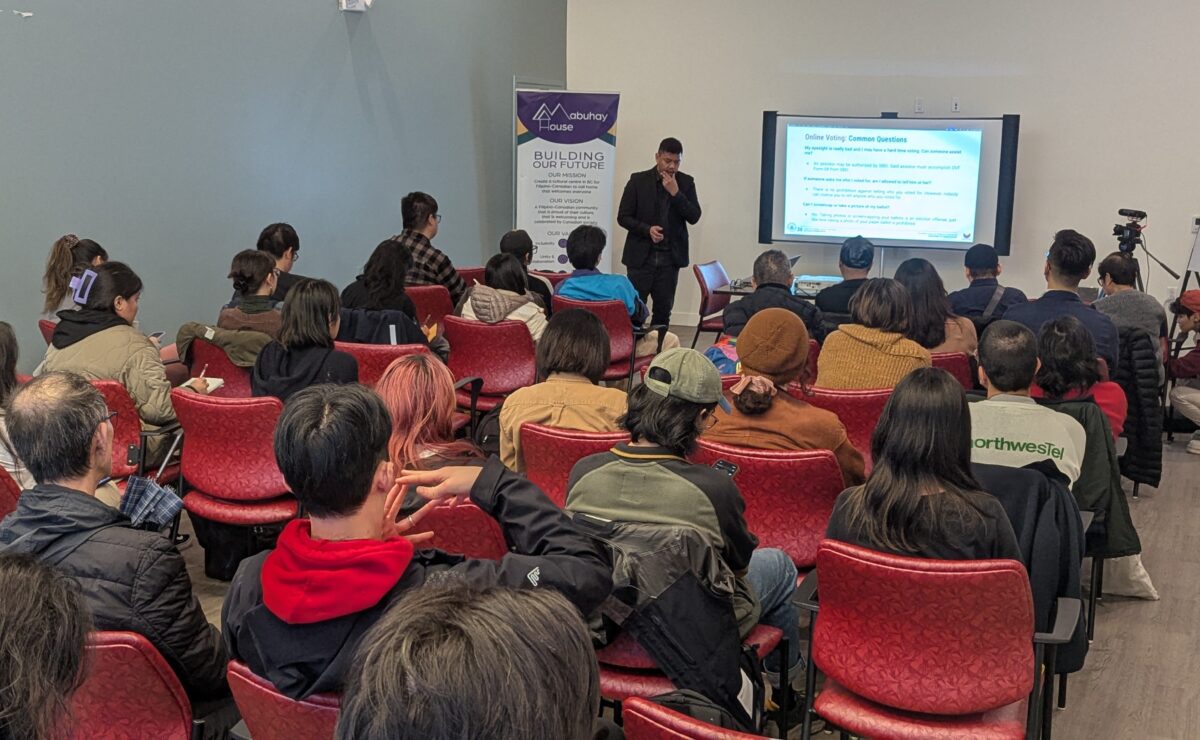Filipinos in Canada gear up for first overseas online voting

Members of the Filipino community attend the Vancouver voters education forum hosted by Migrante BC, Mabuhay House and Pinoy Pride Vancouver. Photo by Nestor P. Burgos
VANCOUVER – Alexine Sanchez is among the Filipino voters in Canada who will be voting for candidates in the 2025 midterm elections in the Philippines.
Like other overseas Filipino voters in at least 77 consular posts in various countries, Sanchez – who had previously voted twice overseas – will be casting her ballot through online voting for the first time.
Voting for about 1.2 million overseas voters started on April 13 and will run for 30 days until May 12, the end of the voting period in the Philippines.
Overseas voters can cast their ballot for a maximum of 12 senatorial candidates and one party-list.
“It is a progressive mode of voting but this requires preparation and adequate information,” she said at the sidelines of a voters’ education forum in Vancouver.
The forum – organized by Migrante BC, Mabuhay House and Pinoy Pride Vancouver – was attended by around 60 members of the Filipino community.
Sanchez said many of her friends, who are also registered voters, are unaware that there will be no mailed ballots in areas where online voting will be implemented. There is also not enough information on the need for pre-voting enrollment for registered voters, she added.
Vice Consul Marco Harder of the Philippine Consulate General (PCG) in Vancouver said the 25-member consulate is holding online and in-person information sessions “so the people can exercise their right to vote.”
The PCG Vancouver has jurisdiction over 21,249 registered voters in British Columbia, Yukon territory and the Northwest Territories.
The post has among the biggest numbers of Filipino voters in Canada, but as of last week, only about 450 voters have enrolled for online voting.
Voter turnout for the three areas under PCG Vancouver in the 2022 national and local elections reached 47 percent. The voter turnout in midterm elections are traditionally lower.
But the PCG Vancouver is optimistic that more voters will enroll for online voting.
“We expect the number to exponentially rise during the voting period,” Harder told Inquirer.net.
Voters in areas where online voting is being conducted will not be given printed ballots, and they need to sign up for the prevoting enrollment for internet voting by May 7 to be able to vote.
Consular posts are open during weekends and holidays during the month-long period to accommodate voters needing assistance for enrollment or for voting in kiosks.
Harder, who also chairs the Board of Electoral Inspectors for the consular post, said online voting is more convenient for voters because they can vote anywhere using computers, tablets and mobile phones.
He said this also provides built-in measures to ensure that voters do not overvote and render their ballot void.
“Voters cannot mark more than 12 senatorial candidates and one party-list in the online voting. Voters are protected from their own possible mistakes,” he said.
Among the most common questions the Consulate has received are whether paper ballots will still be sent out and if voters can still register for next month’s elections, Harder said.
He emphasized that the last day to register for the 2025 midterm elections was on September 30, 2024, and only those who are registered voters can enroll for online voting.
Jaela Villegas of Migrante BC said there was a need for more effective outreach efforts because many members of the Filipino community did not receive the information provided by the Philippine government.
“There is a risk of voter disenfranchisement if they cannot enroll for online voting. We know of many kababayans (compatriots) who were unable to register because they just recently came here as migrants or as international students,” Villegas said.

